The Economics and Statistics Division maintains archives of previous publications for accountability purposes, but makes no updates to keep these documents current with the latest data revisions from Statistics Canada. As a result, information in older documents may not be accurate. Please exercise caution when referring to older documents. For the latest information and historical data, please contact the individual listed to the right.
<--- Return to Archive
For additional information relating to this article, please contact:
March 21, 2023NEW BRUNSWICK BUDGET 2023-24 New Brunswick released its 2023-24 Budget on March 21. The Province of New Brunswick's Budget anticipates a surplus of $40 million in 2023-24, down from a surplus of $863 million forecast for the 2022-23 fiscal year as the Province expects revenues to contract and expenses to rise. In the next two fiscal years, New Brunswick also plans to run small surpluses.
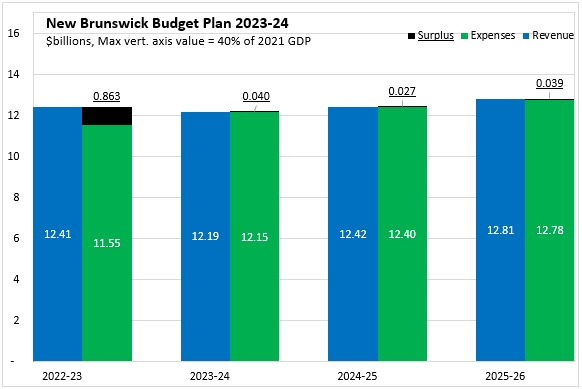
As in many provinces, New Brunswick's revenues for 2022-23 grew more rapidly than expected. Revenues are projected to decline in 2023-24 due to tax reductions as well as moving carbon revenues to the Federal backstop. Expenditures are planned to rise to a similar level to revenues, resulting in small Budget surpluses over the three year fiscal planning horizon.
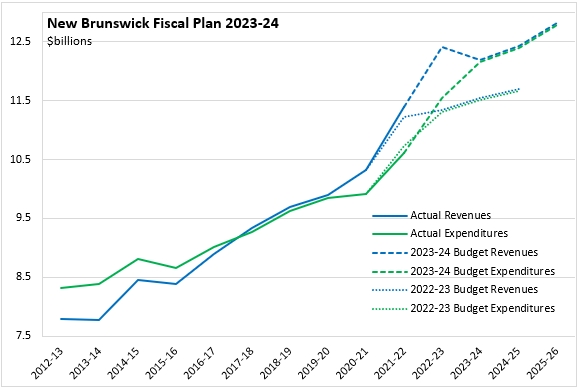
New Brunswick's projected surpluses outperformed expectations in each of the last two fiscal years. However, the level of surplus is projected to return to modest levels in the next three fiscal years.
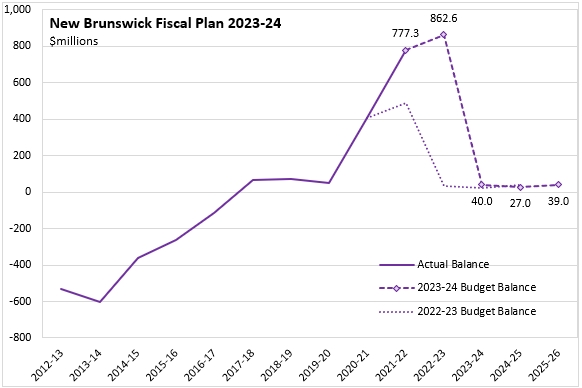
New Brunswick's 2022-23 Budget surplus was equivalent to 1.9% of GDP. In subsequent fiscal years, the surplus is projected to be just 0.1% of GDP.
The footprint of provincial government in the New Brunswick economy amounts to 25.7% of GDP in 2023-24. This is projected to contract to 25.1% by 2025-26.
New Brunswick's net debt for 2023-24 is projected to be 24.9% of the province's projected GDP. This ratios is projected to fall to 23.4% of GDP by 2025-26.

New Brunswick's Budget projects expenditures of $14,700 per capita in 2023-24, rising to $15,119 per capita by 2025-26.
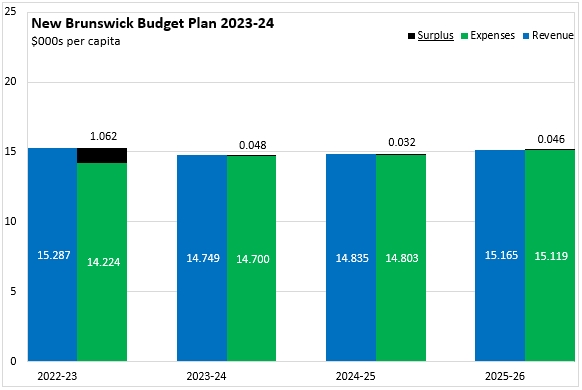
New Brunswick's GDP growth is projected to slow as the effects of higher interest rates and slowing global economic growth weigh on consumer confidence, investment and exports. Expectations for real GDP growth have been revised down to 0.8% for 2023 (2.3% in nominal terms). The outlook for 2024 GDP growth is 1.6% in real terms (4.1% nominal).
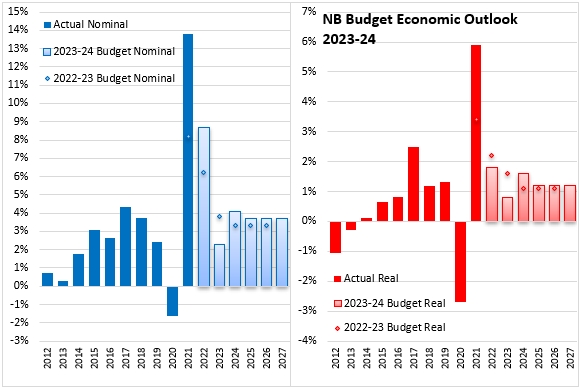
Key Measures and Initiatives
The New Brunswick Budget for 2023-24 prioritizes: energizing the private sector, vibrant and sustainable communities, dependable public health care and building a better education system.
- Energizing the private sector includes adoption of previously-announced tax reductions as well as moving to the Federal backstop carbon price as well as:
- $10 million to support the development and delivery of energy efficiency and energy conservation programs
- $4.5 million to increase the Crown land silviculture program
- $14 million to manage the impact of rising commodity prices on building and transportation assets
- Vibrant and sustainable communities includes:
- $4.4 million for local governance reform and $3.1 million to assist local governments with marketing their new names
- $32.6 million to increase police visibility and maximize officer time in the community
- 15% increase in the number of frontline RCMP officers
- $44.9 million to increase wages for personal support workers in home support and special care homes
- $9.7 million for wage increases for group homes, community residences, family support, and attendant care
- $13.7 million to service providers to help with the rising cost of travel for caregivers
- $13.4 million to index social assistance rates
- $12.6 million to support the nursing home plan and add to the supply of nursing home beds
- $8.8 million to address increasing operating costs to help home support agencies offering long-term care and disability support services
- Dependable public health care includes:
- $72.1 million to ease demand, inflation and other pressures on the health care system
- $39.2 million to improve access to primary health care
- $29.7 million to address recruitment and retention
- $3.1 million to consolidate hospital and laboratory information systems and improve access to diagnostic imaging data
- $2.1 million for better diabetes management including expanding the insulin pump program
- Building a better education system includes:
- $37 million to improve access to designated child-care spaces (via child care agreement)
- Additional funding to support the creation of additional preschool spaces within the for-profit sector
- $33.3 million to accommodate a growing population in the education system as well as supporting language acquisition of newcomer students and student access to healthy foods
- $30.8 million to improve the inclusive education system and supporting pre-school children with autism spectrum disorder
- $8.7 million to help close the learning gap in student achievement in literacy and numeracy
New Brunswick Budget 2023-24
<--- Return to Archive